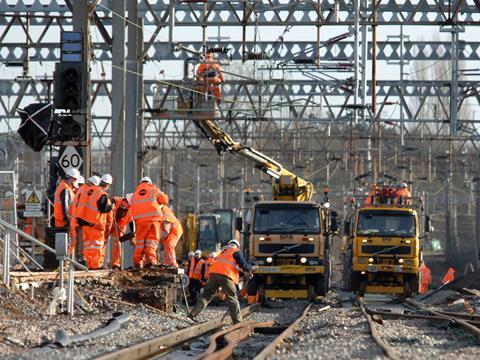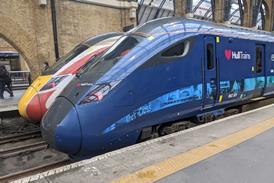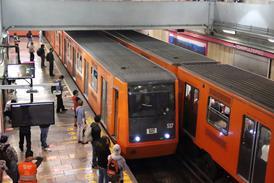
UK: Infrastructure manager Network Rail’s agreed works programme for Control Period 5 from 2014 to 2019 is to be reviewed and ‘reset’, Secretary of State for Transport Patrick McLoughlin told the House of Commons on June 25, with the planned electrification of the Midland Main Line and trans-Pennine routes to be ‘paused’.
The CP5 programme includes spending of £38bn, but McLoughlin said performance had not been good enough, with important aspects ‘costing more and taking longer’ than planned. ‘These problems could and should have been foreseen by Network Rail’, he said.
There will be changes at Network Rail, with governance simplified ‘by ending the role of the Public Members’. Richard Parry-Jones is to step down as Chairman and will be replaced by Sir Peter Hendy, currently Commissioner of Transport for London. Former Eurostar Chairman Richard Brown has been appointed as Special Director with immediate effect and will report directly to the Secretary of State. None of Network Rail’s executive directors is to receive a bonus for the past year.
McLoughlin has asked Hendy to develop proposals by the autumn for how the CP5 programme should now be carried out. In parallel, experienced regulator Dame Colette Bowe is to publish a report making recommendations for better investment planning in the future.
In response to the announcement, CEO Mark Carne said Network Rail had been ‘overly optimistic’ about the capacity of the company and its supply base, ‘especially given the complexities of a network that is at full capacity much of the time.’ He added that the regulatory process includes revisiting the cost and scheduling of major projects, and ‘when these reviews have occurred, the more detailed project costs have been higher than assumed at the earliest stages of definition.’ As a result, programme costs now exceed the five-year budget.
McLoughlin said spending should stay within the funding allocated, and the ongoing electrification of the Great Western Main Line is ‘a top priority’. As a result, planning for electrification of the MML and trans-Pennine routes is to be ‘paused’, with future completion dates to dependent on Hendy’s findings.
MML electrification had been scheduled to follow the GWML, and McLoughlin said better services could be delivered ahead of electrification through raising line speeds at locations including Derby.
The next TransPennine Express franchise would ‘bring modern trains and additional capacity’, said McLoughlin, and plans to electrify the Manchester – York route would also be paused ‘because we need to be much more ambitious for that route’. He added that a ‘fast, high-capacity trans-Pennine electric route’ would support the government’s Northern Powerhouse strategy to rebalance the economy.
Responding on behalf of the rail industry, Michael Roberts, Director General of the Rail Delivery Group, said that people and businesses who relied on rail would be disappointed that certain planned improvements would be delayed. ‘The majority of proposed enhancements will still go ahead, and it is important that the industry, government and regulator learn from this situation to ensure we do better in delivering the future improvements the railway needs,’, he said.





































